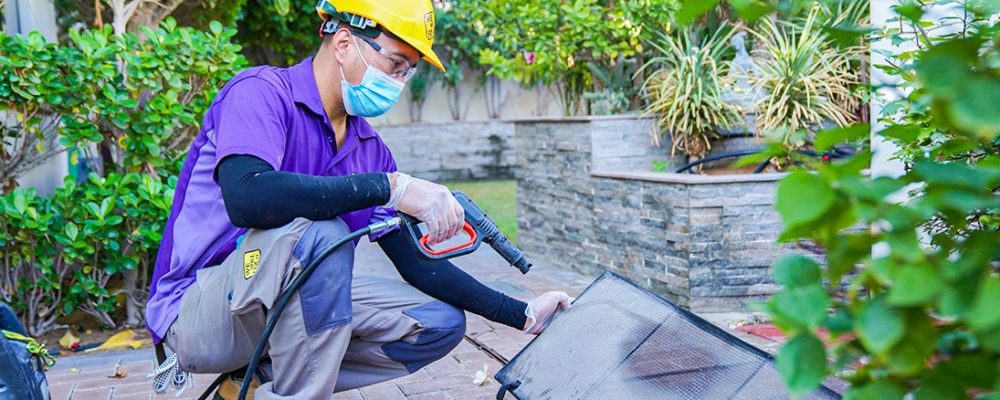Air conditioner allergy refers to allergic reactions triggered by AC units. Common symptoms of this condition include sneezing, coughing, itchy eyes, and a runny nose.
However, this condition is not caused by the air conditioner itself. The airborne allergens released by the AC unit trigger it.
Regular AC cleaning in Dubai can help you avoid this health problem and allow you to breathe clean and healthy indoor air. By keeping your air conditioning unit clean and well-maintained, you and your family can enjoy staying cool at home without any allergic discomfort.
Common Causes of Air Conditioner-Induced Allergies
Below are the usual causes of air conditioner allergies:
1. Pollen
Pollen can get into your home through open windows and doors. It can also stick to your clothes and footwear when you go outdoors, which means you can bring them indoors.
If your AC filter is ineffective, it can circulate this allergen indoors and trigger sneezing, congestion, and other allergy symptoms, especially during pollen season.
2. Pet dander
If you have furry or winged pets, you likely have dander in your home. These tiny flecks containing fur, hair or feathers, common allergy triggers and can be spread through the air by your AC system, especially if you don’t vacuum regularly.
3. Dust mites
Dust mites live in humid environments and can accumulate in your air conditioner. When your AC is running, it distributes these microscopic creatures and their waste, triggering allergies and asthma symptoms.
4. Mould and mildew
Mould and mildew can grow in your AC unit’s damp, cool environment. When you turn it on, it can blow mould spores into the air, causing allergic reactions.
These mould spores can also aggravate asthma and cause other respiratory illnesses.
5. Volatile organic compounds (VOCs)
VOCs are chemicals released from household cleaning products and building materials. These compounds can accumulate in the AC system and circulate indoors, causing allergic reactions and other conditions, including throat irritation, dizziness and headaches.
Keeping Air Conditioner Allergies at Bay
If you want to know how to prevent your air conditioner from causing and aggravating allergies at home, read below:
1. Change and clean your AC filters regularly.
AC filters trap dust, pollen, mould spores, and other allergens that accumulate over time. If you don’t replace and clean them frequently, these particles simply circulate back into your living space, causing and aggravating allergy symptoms.
As such, replace your AC filters every one to three months based on your usage and manufacturer recommendations to keep them clean and properly functioning. Opt for HEPA filters since they are highly effective in blocking out 99.9% of harmful airborne particles.
You should also clean the filters every two to three months to prevent the accumulation of dust, dirt, debris and other particles that can cause allergies in your air conditioner.
2. Make it a habit to clean the condenser coils.
Condenser coils filter out allergens and other pollutants from the air. If they are dirty, it means your unit is not functioning optimally and releasing unhealthy particles in your home.
Dirty coils can also affect the condenser’s dehumidifying ability, making your home more prone to mildew and mould.
Check the coils at least once a year to ensure they are not blocked with dirt and debris. If they are dirty and clogged and you are unsure how to clean them, call a trusted HVAC contractor to clean them and conduct other necessary maintenance tasks.
3. Invest in professional AC maintenance.
Regular professional maintenance can help you keep your AC in top condition and prevent air conditioner allergies. Seasoned technicians can clean and inspect your cooling unit, ensuring all components function correctly.
During maintenance, the technicians will clean and replace the filters when needed, removing accumulated dust, pollen, dirt and pet dander that can trigger allergic reactions.
Regular professional maintenance enhances the efficiency and lifespan of your air conditioner and ensures you have a healthy, allergen-free home.
Additional Tips for Reducing Allergens at Home
Although cleaning and maintaining your AC unit are the most important tips for reducing allergens in your home, you still need to follow some additional steps to keep it allergy-free.
1. Maintain a clean home.
Run a vacuum with a HEPA filter over your carpets and rugs at least once a week totrap allergens and other tiny particles. Use a damp cloth when dusting surfaces to avoid dispersing allergens into the air.
Use hot water to wash bedding and other household fabric items to get rid of dust mites and other allergens. If you have blinds, dust them regularly as well.
2. Consider switching to allergen-proof bedding.
Invest in allergen-proof covers for mattresses, pillows, and duvets. These beddings are designed to create a barrier that prevents dust mites, pet dander, and other allergens from penetrating your bedding.
Also, wash covers and bedding materials in hot water regularly.
3. Control indoor humidity.
Use a dehumidifier to keep humidity at healthy levels in your home. Doing so keeps mould and dust mites at bay.
Use an exhaust fan to ventilate bathrooms, kitchens, and other damp areas. Make sure you fix leaks promptly to prevent mould growth and maintain a healthy home.
A well-maintained, properly working air conditioner is an excellent foundation for keeping a healthy, allergy-free home. Because of this, make it a habit to clean and maintain your AC unit.



